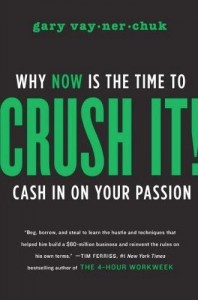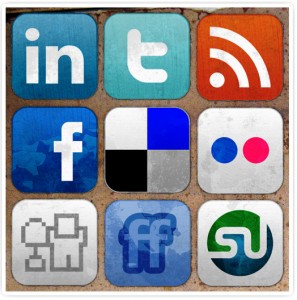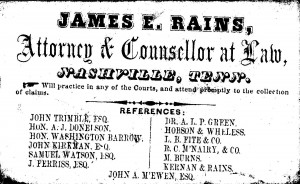 I wrote this brief review of “Crush It!” by Gary Vaynerchuck on another blog more than a year ago. My knowledge and use of social media has come a long way since then. I’ll post reviews of other books I’ve read that have more of the “how to’s” but this is the book to read if you want to know “why to”.
I wrote this brief review of “Crush It!” by Gary Vaynerchuck on another blog more than a year ago. My knowledge and use of social media has come a long way since then. I’ll post reviews of other books I’ve read that have more of the “how to’s” but this is the book to read if you want to know “why to”.
—
I’d heard a lot of good things about “Crush It!” and finally downloaded it (kindle for PC, in case you’re curious). I’m fairly new to the world of social media marketing so I was surprised at how much I already knew and how much I was already doing.
After reading Crush It!, I now know (a) social media marketing is not a passing fad, (b) properly implemented, it’s an incredibly powerful way to build almost any kind of business, and (c) it’s not that complicated. In other words, if you market something on the Internet, or you want to, you need to add social media marketing to your marketing mix and it’s a lot easier than you may have thought.
Now, if you’re looking for a detailed manifesto on social media marketing, this isn’t it. It’s a great story and a compelling look at the power of social media marketing and worth it for that alone. Where it really shines, however, is in driving home the importance of finding your passion, your DNA as Vaynerchuk calls it, and building your brand, and your business, around that.
Vaynerchuk makes you think about who you are and what drives you. If you’re going to “crush” anything, it’s going to have to be something you are passionate about, or you won’t do it enough, or well enough, to cut through the noise and clutter that competes for the eyes and ears of your target market. If you don’t enjoy what you’re doing, you aren’t going to make it; if you do, the journey will be as rewarding as the destination.
A friend of mine often says, “if you do what you love and you love what you do, you’ll never work another day in your life.” Â No doubt Gary Vaynerchuk would agree.













How to be rich and happy
When I was young, I wanted to be a writer. That was my dream. I loved reading and the feel and smell of books. I haunted libraries and bookstores, imagining my own books in the windows and on the shelves.
I was a voracious reader. Non-fiction and fiction. Business, marketing, biographies, history; mysteries, thrillers, detective novels, science fiction. And books on writing.
But while I have written extensively throughout my career, early on, I somehow convinced myself that writers don’t make much money and I needed to do something more remunerative. Make money first, then I can retire and write all I want.
I now know this is folly.
To deny your passions, no matter the financial ramifications, is to deny the truth of who you really are. Working to make money so you can then do something else is simply bad advice.
But what if what you are passionate about is a one way ticket to financial mediocrity? At some point, you have to ask yourself, “What’s more important, money or happiness?” Yes, money is important and having more of it gives you more options. But having money does not guarantee happiness. Legions of unhappy wealthy people attest to that.
How about asking a different question: “What if what you are passionate about can lead to wealth and happiness?” It can, you know. In fact, I believe that following your passion is a much better road map to prosperity than working for money.
I’ve accomplished a lot in my career. I’ve done well financially. Â And now, decades after my childhood passion first stirred in me, I am writing. This blog is just the tip of the iceberg.
How does it feel? It feels. . . right. I can’t describe what I feel as excitement, it’s more a feeling of serenity, of “this is who I am and where I belong”.
But I also have flashes of regret.
What if I had listened to my inner child, the one who wanted to be a writer? What if I had ignored the voice of “logic” that told me to do something else? Where might I be today?
I don’t know if I’d be rich, but I know I’d be happy.
If I’d read the story of “The Rich Fisherman,” I might be in a different place today: